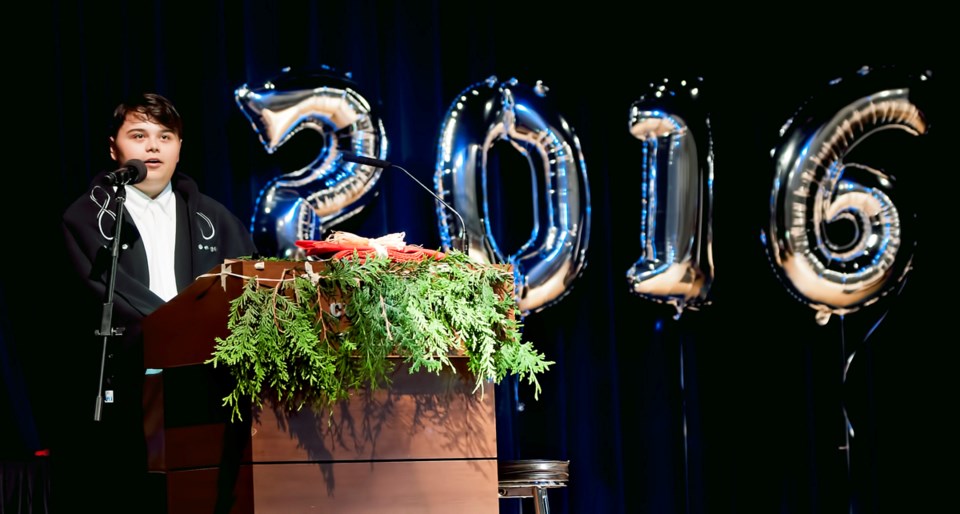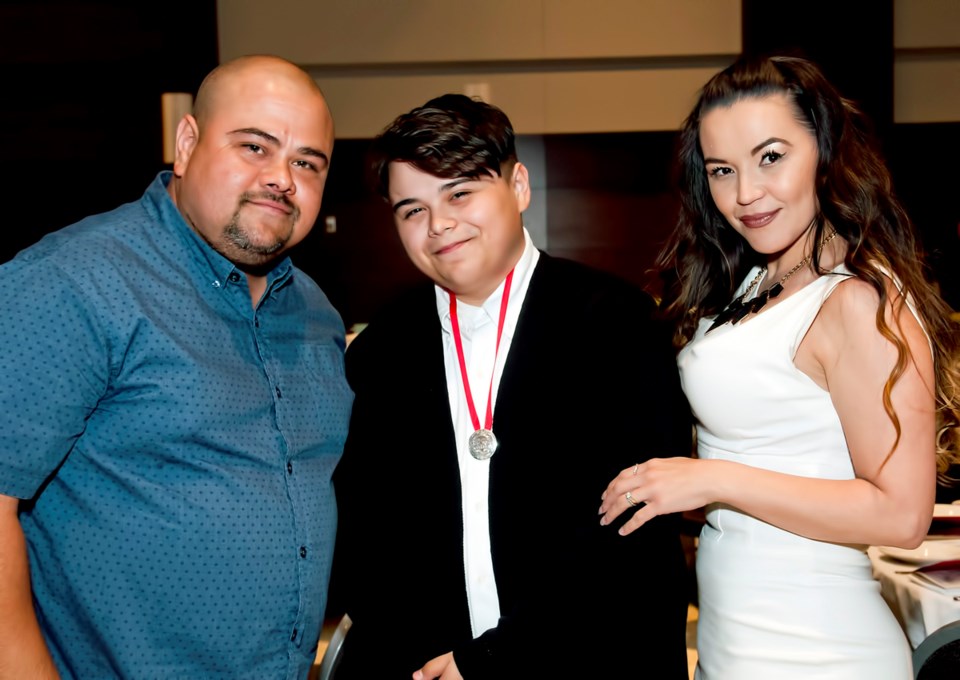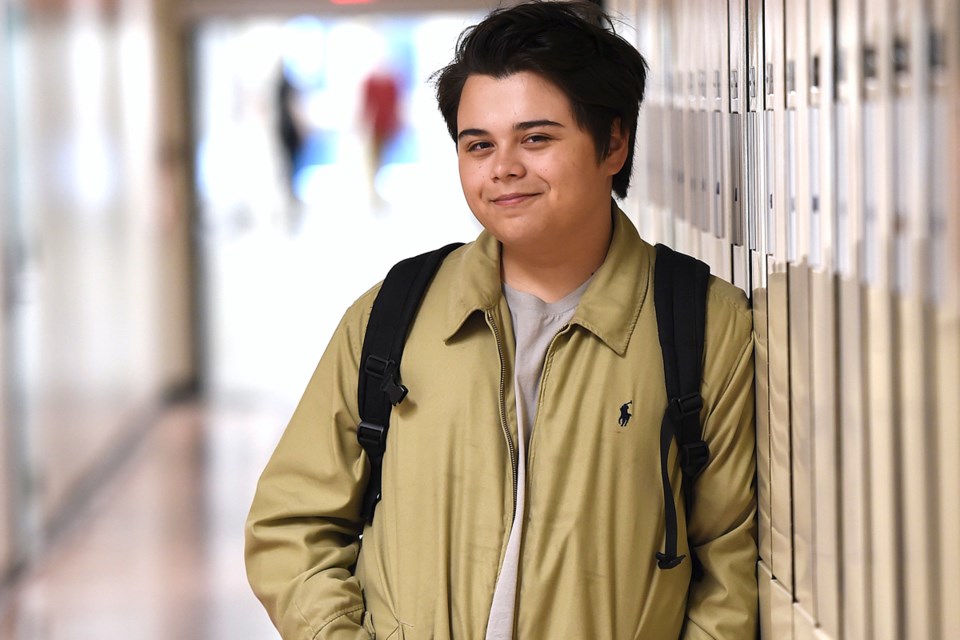At 18, Isaiah Lehtinen has got a lot going on.
He’s an actor.
He’s a solo rap artist.
He’s a Langara College business student.
Five months ago, he added valedictorian to his resume.
But the ceremony he attended at the Italian Cultural Centre in June was not as the student spokesperson for the entire population of his high school, Britannia secondary.
Instead, he spoke on behalf of indigenous graduates from across the Vancouver school district in what was billed as an Aboriginal graduation celebration.
Lehtinen is Metis.
And he’s among a steady number of indigenous students who continue to graduate from high school in Vancouver. That rate, according to school board officials, has hovered around 85 per cent in recent years.
It’s an impressive rate, although it only applies to students in Grade 12 at the time of graduation. It does not consider the number of students who entered a Vancouver school in Grade 8 but failed to graduate.
That rate is not so good, with only 47 per cent of those indigenous students in the 2014-2015 school year completing high school in Vancouver. Data on the 2015-2016 school year won’t be available until January, according to the school board, which has various theories for the 47 per cent graduation rate, including students moving to other districts, enrolling in private schools or on-reserve schools and dropping out.
“Admittedly, there are a number of those students who do drop out while they are still in the [Vancouver] system, and so that is an issue we have to work hard on — getting our Aboriginal students to remain in school from Grade 8 through Grade 12, but we don’t believe that 53 per cent of them drop out and remain in Vancouver,” wrote associate superintendent Nancy Brennan in an email to the Courier.
Statistics were on Lehtinen’s mind that night in June when he walked on stage in a traditional Coast Salish robe and delivered a speech to students, parents, teachers, school board superintendents and politicians.
“Statistics and numbers will say that this is an anomaly, that native people aren’t meant to be successful or don’t have the capacity to achieve like our friends of other races do,” he said. “But the numbers and statistics aren’t standing up here, looking over a crowd of successful indigenous youth surrounded by their friends, family and community members who have nothing but love and undying support for them.”
He continued. “The numbers and statistics aren’t ready for what’s coming next. They aren’t ready to ride with us on the journey to more success. We leave today as the new generation of indigenous youth that have no need to be bound by the preconceptions of what native people can and cannot do."

Business degree
Lehtinen is still very much on point with his words as he begins his first year at Langara, where he plans to complete a business administration degree. Many friends of Aboriginal descent have joined him at Langara, all of whom are driven to combat the stereotypes and clichés connected to young indigenous people.
“Some of us are the first in our families to go to college — period — or to graduate high school — period,” said Lehtinen, as he sat in a courtyard at Langara prior to a marketing class. “There seems to be this status quo that, ‘You’re native, you’re going to drop out in the 10th grade and sell weed, or just bum welfare or something like that.’ Not true.”
Lehtinen said the Internet has connected his Aboriginal friends in a way unlike previous generations, where articles and documents are available on Canada’s dark history of colonialism and residential schools. That information is shared on Facebook and other social media platforms, educating and inspiring young people like him to post their views, to stand up and pursue higher learning; more than 350 students enrolled at Langara in the past school year self-identified as indigenous.
“I feel like we’re really able to get the whole picture as the new generation. We’re able to fully realize what impact things like colonialism have had on our lineages, and we’re able to rise above it and see into the clear future.”
Coincidentally, Lehtinen is attending a school that offers a variety of Aboriginal studies programs, has an elder-in-residence and a strong connection to the Musqueam Indian Band, which bestowed the name Snow-i-ith-lalum — which translates to “house of teachings” — on Langara earlier this year.
For such an articulate young man, an assumption might be made that Lehtinen’s passion for his heritage and battling stereotypes would transfer well to his career as a rap artist.
That’s not the case. The self-described absurdist, who raps under the name Hermit, is more inspired by video games and Japanese anime. He often makes references to his interests, having recently performed at the Rifflandia festival in Victoria, where promoters described him as being loved by his fans “for his weirdo, social-reject personality and the insane hype at his shows.”
He makes music to have fun, he said, not to get political.
“I try to stray from politics and things like that.”
Why?
“I feel like I’m not a person who can articulately express the way I feel about things through music. I feel like I could sit down and talk with someone about things like that and express myself in a fine way. But I feel music is just not the medium I want to express my feelings in.”
Support workers
Lehtinen is able to study at Langara this semester because of a $3,000 grant he received from the Aboriginal Community Career Employment Services Society. He credits his Aboriginal support workers at his high school for helping him secure the grant. Without it, he said, he would not be able to attend Langara.
“I’m one of three kids, we live in the Downtown Eastside, both my parents work but I just couldn’t afford to go without [the grant],” he said, noting his income used to come from selling shoes and washing dishes. He continues to look for work and, for now, relies primarily on money he makes from music shows or acting gigs. He recently had a significant role in the Vancouver-shot television series The Flash, and a small part in an upcoming movie with actor Kevin Bacon.
If acting or rapping doesn’t end up paying the bills in the future, Lehtinen hopes a business degree will give him the skills to work in one of the industries as a talent agent or record producer.
As he reflected on where he is now and where he wants to go, he acknowledged his parents, Shauntele and Darcy, helped him get to this point. Lehtinen told a story of how his dad, who is a project manager for a construction company, put him to work laying pipe one summer.
“He really instilled in me the value of hard work,” he said. “He made me understand I have to work super, super hard and that being a minority in a prominently white city and country, I have to work extra, extra hard to get what I want and what I feel I deserve.”
His parents were in the back of the hall at the Italian Cultural Centre in June when Lehtinen made his speech. His mother is Cree-Irish and his father is Mexican-Finnish. Both are high school graduates.
“Awesome, really good, really proud right now,” was how Lehtinen’s father responded after the ceremony. His mother was equally pleased. “One down, two more to go,” she said of her three sons.

The point about parent support was one Don Fiddler, the district principal of Aboriginal education in Vancouver, made on the night of Lehtinen’s speech — and the previous day at a signing ceremony to renew the district’s Aboriginal Education Enhancement Agreement, which was created in 2009 to improve academic success for indigenous students. At last count, there were 2,100 self-identified indigenous students from 600 bands in the district.
“The fact is,” said Fiddler, who is of Metis-Cree heritage, “our parents now are better educated 10 years later than they were 10 years before. And we know there’s a direct relationship to parents who have graduated from high school and when their kids graduate from high school.”
But what about the 53 per cent statistic that associate superintendent Brennan highlighted, and how only 47 per cent of indigenous students enrolled in Grade 8 in Vancouver graduated from Grade 12?
Fiddler’s initial response to the Courier’s question is the media is obsessed with statistics. And statistics don’t tell the whole story, he added.
“Over the last number of years, the media in particular as well as others, go for the sound bites,” he said. “They love to report how downtrodden we are as people. They love to report all the terrible things that are happening. But the truth of the matter is terrible things are not happening to all of our people. The truth is most of our people are very successful.”
High enrolment
He went on to say indigenous people have the highest rate of college enrolment in the country. It’s been that way for the past 20 years, he said.
Lehtinen, who finished high school with A’s and B’s, is now included in that statistic. He wants to ensure his brothers make that step to higher learning, too.
“I want my little brothers to know that college is not something out of reach for any of us,” he said.
Which is a point he made to his fellow graduates in June as he closed his speech. Find, he said, something in life you’re passionate about and pursue it.
“Are you passionate about visual art? Awesome, pursue it. Are you passionate about high concept math? Awesome, figure it out, pursue it. Are you passionate about game design? That’s cool, too, man. Pursue it. Are you passionate about your community and opening up opportunities for all people? Awesome, pursue it.”
[email protected]
@Howellings


